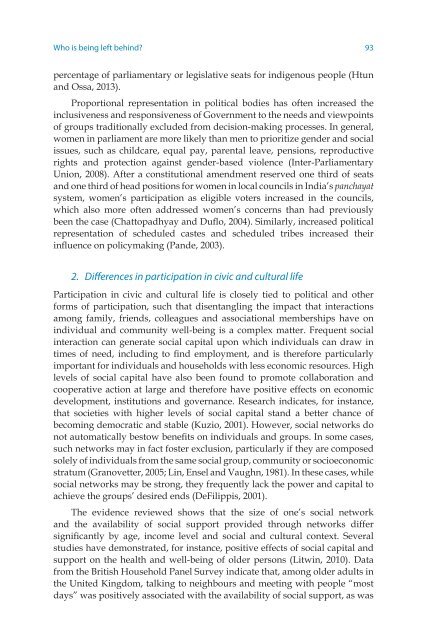Leaving no one behind the imperative of inclusive development
full-report
full-report
You also want an ePaper? Increase the reach of your titles
YUMPU automatically turns print PDFs into web optimized ePapers that Google loves.
Who is being left <strong>behind</strong>? 93<br />
percentage <strong>of</strong> parliamentary or legislative seats for indige<strong>no</strong>us people (Htun<br />
and Ossa, 2013).<br />
Proportional representation in political bodies has <strong>of</strong>ten increased <strong>the</strong><br />
<strong>inclusive</strong>ness and responsiveness <strong>of</strong> Government to <strong>the</strong> needs and viewpoints<br />
<strong>of</strong> groups traditionally excluded from decision-making processes. In general,<br />
women in parliament are more likely than men to prioritize gender and social<br />
issues, such as childcare, equal pay, parental leave, pensions, reproductive<br />
rights and protection against gender-based violence (Inter-Parliamentary<br />
Union, 2008). After a constitutional amendment reserved <strong>one</strong> third <strong>of</strong> seats<br />
and <strong>one</strong> third <strong>of</strong> head positions for women in local councils in India’s panchayat<br />
system, women’s participation as eligible voters increased in <strong>the</strong> councils,<br />
which also more <strong>of</strong>ten addressed women’s concerns than had previously<br />
been <strong>the</strong> case (Chattopadhyay and Duflo, 2004). Similarly, increased political<br />
representation <strong>of</strong> scheduled castes and scheduled tribes increased <strong>the</strong>ir<br />
influence on policymaking (Pande, 2003).<br />
2. Differences in participation in civic and cultural life<br />
Participation in civic and cultural life is closely tied to political and o<strong>the</strong>r<br />
forms <strong>of</strong> participation, such that disentangling <strong>the</strong> impact that interactions<br />
among family, friends, colleagues and associational memberships have on<br />
individual and community well-being is a complex matter. Frequent social<br />
interaction can generate social capital upon which individuals can draw in<br />
times <strong>of</strong> need, including to find employment, and is <strong>the</strong>refore particularly<br />
important for individuals and households with less eco<strong>no</strong>mic resources. High<br />
levels <strong>of</strong> social capital have also been found to promote collaboration and<br />
cooperative action at large and <strong>the</strong>refore have positive effects on eco<strong>no</strong>mic<br />
<strong>development</strong>, institutions and governance. Research indicates, for instance,<br />
that societies with higher levels <strong>of</strong> social capital stand a better chance <strong>of</strong><br />
becoming democratic and stable (Kuzio, 2001). However, social networks do<br />
<strong>no</strong>t automatically bestow benefits on individuals and groups. In some cases,<br />
such networks may in fact foster exclusion, particularly if <strong>the</strong>y are composed<br />
solely <strong>of</strong> individuals from <strong>the</strong> same social group, community or socioeco<strong>no</strong>mic<br />
stratum (Gra<strong>no</strong>vetter, 2005; Lin, Ensel and Vaughn, 1981). In <strong>the</strong>se cases, while<br />
social networks may be strong, <strong>the</strong>y frequently lack <strong>the</strong> power and capital to<br />
achieve <strong>the</strong> groups’ desired ends (DeFilippis, 2001).<br />
The evidence reviewed shows that <strong>the</strong> size <strong>of</strong> <strong>one</strong>’s social network<br />
and <strong>the</strong> availability <strong>of</strong> social support provided through networks differ<br />
significantly by age, income level and social and cultural context. Several<br />
studies have demonstrated, for instance, positive effects <strong>of</strong> social capital and<br />
support on <strong>the</strong> health and well-being <strong>of</strong> older persons (Litwin, 2010). Data<br />
from <strong>the</strong> British Household Panel Survey indicate that, among older adults in<br />
<strong>the</strong> United Kingdom, talking to neighbours and meeting with people “most<br />
days” was positively associated with <strong>the</strong> availability <strong>of</strong> social support, as was
















